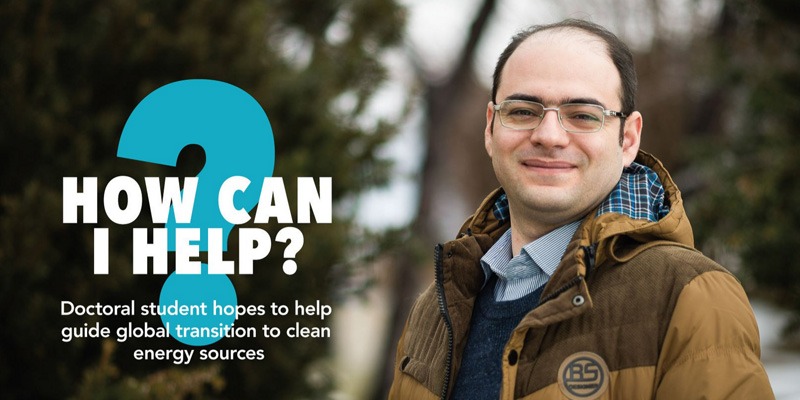How can I help?

As a child growing up in Iran, Davoud Ghahremanlou developed a fascination with transportation by observing the world around him.
The doctoral student in the Faculty of Business Administration was raised in a primarily agricultural community that offered many opportunities for play and discovering the outdoors. Its benefits were known to the adults around him as well — people from nearby cities would drive to his community to purchase fresh fruits and other produce. They in turn would bring goods and services to sell that were not widely available in Mr. Ghahremanlou’s small town.
“To us, it was like happiness,” he said of the days when trucks would arrive from the cities, bringing fabric, appliances and other products.
“I was thinking that if we removed the connection, which are trucks and the transportation, we are two separate places. We can’t get connection to the big cities, which means we can’t receive what we want, and they can’t get what they need.”
‘How is this possible?’
Access to transportation was also often a matter of life and death for those who did not own a vehicle. Mr. Ghahremanlou’s grandfather owned a vehicle and often got requests to transport people to the nearest hospital.
“Those moments were really bad,” he said. “People had to bear more pain because they couldn’t reach the hospitals fast. As a child at the time, I was thinking, how is this possible?”
Later, Mr. Ghahremanlou and his family moved to a larger city. He again observed both pros and cons associated with motor vehicle transportation. He noticed that families in his new community spent less quality time together and more time managing traffic and commutes.
“To me, happiness of the society is the most important thing.” — Davoud Ghahremanlou
As a result, he says, people in the city didn’t seem as happy as those in his former community.
“To me, happiness of the society is the most important thing. And happiness does not come when people are not healthy, there is no good economic conditions and no clean environment around. I think they’re all tied together.”
Real-world impact
Mr. Ghahremanlou grew up in a family primarily made up of engineers. As he began his post-secondary studies in the same field, he turned his youthful observations into academic scholarship — first studying industrial engineering in Iran and later doing master’s research in India.
“What can I do for these people? That’s the question which I ask myself every day.” — Davoud Ghahremanlou
In India, he conducted field research that looked at improving the efficiency of transportation networks for water delivery using auto-rickshaws and moving consumer goods from the state capital of Mumbai to the university town of Poona.
Those real-world projects allowed him to see the impact of this kind of research first hand, spurring an interest in the importance of supply chains and transportation networks.
“Going out every day, communicating with people, understanding their concerns, coming home at the end of the day, looking at yourself in the mirror and saying, okay, what can I do for these people? How can I help them out? That’s the question which I ask myself every day,” he said.
“I decided to dedicate my life, skills and knowledge to start doing research on what transportation fuel supply chains are, and what they should be, to avoid the problems that I’ve noticed since my childhood.”
Planning the process
Mr. Ghahremanlou’s desire to make a positive impact in the world of science led him to Memorial, where he is currently pursuing a PhD focused on supply chains for sustainable transportation fuels.
His supervisor is Dr. Wieslaw Kubiak, a University Research Professor in the Faculty of Business Administration. His supervisory committee also includes Dr. David Tulett from the business faculty and Dr. Kelly Hawboldt from the Faculty of Engineering and Applied Science.
He aims to do his part for society, the environment and the economy by providing insight into how the fuel industry can transition from crude-based fuels to sustainable energies. Too drastic a shift can have negative consequences for all, he says, including job losses, corporate bankruptcies, industry instability, deforestation and agricultural land infertility.
It’s a process that must be well-planned to avoid negative consequences, he says. He hopes his research will help governments, regulators and businesses around the world make informed decisions.
“The bottom line is we’re trying to create jobs for people, give people a cleaner environment and enhance the economy with the sustainable transportation fuel supply chains.”
Mr. Ghahremanlou’s forthcoming doctoral thesis focuses on this transition, findings which he presented at an International Federation of Operational Research Societies‘ conference and will present at the annual conference for the Canadian Operational Research Society in June.
His research to date has been funded by a grant awarded to Dr. Kubiak from the Natural Sciences and Engineering Research Council, as well as a BMO Financial Group Scholarship and a Dean’s Doctoral Award from the School of Graduate Studies.